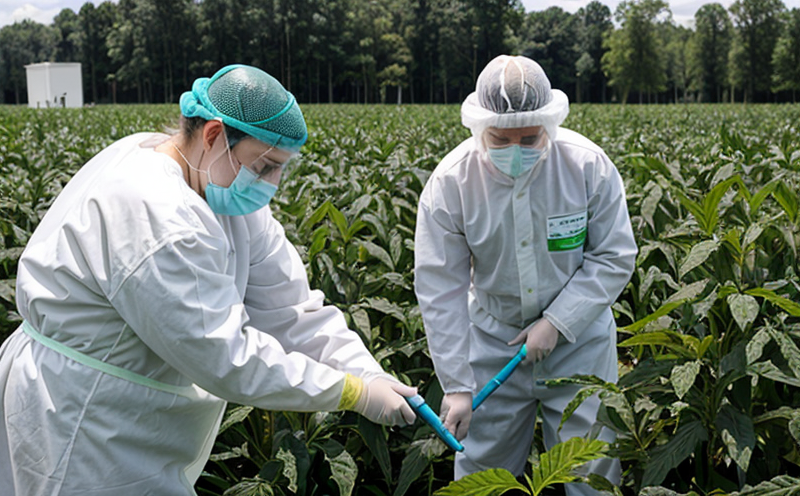OECD 302 Inherent Biodegradability Testing in Beneficial Microbes
The OECD 302 test is a critical tool used to evaluate the inherent biodegradability of beneficial microorganisms and biocontrol agents. This standardized method ensures that these organisms can decompose naturally under aerobic conditions, which is essential for their safe use in agriculture and other sectors.
Beneficial microbes play a crucial role in enhancing crop health, suppressing plant pathogens, and improving soil quality. For these applications to be successful, it's imperative that the microorganisms are not only effective but also environmentally friendly. The OECD 302 test provides a robust framework for assessing the biodegradability of these beneficial microbes, ensuring their safety when released into the environment.
During this testing procedure, samples of the biocontrol agents or beneficial microbes are incubated in a controlled laboratory setting under aerobic conditions. After 28 days, the extent to which the microorganisms have decomposed is measured by comparing the initial and final concentrations. This test helps ensure that the organisms do not persist in the environment beyond their intended use.
The OECD 302 method aligns with international standards such as ISO 14592-2, ensuring consistency across different laboratories worldwide. Compliance with these standards is crucial for regulatory approval and market entry.
This testing process is vital because it helps to mitigate environmental risks associated with the use of biocontrol agents and beneficial microbes. By confirming their inherent biodegradability, we can ensure that these organisms do not contribute to pollution or other ecological issues when used in agricultural applications. This testing also supports the development of safer and more sustainable pest management strategies.
Understanding the inherent biodegradability of beneficial microbes is essential for R&D engineers who are developing new biocontrol agents. It allows them to refine their formulations, ensuring that the organisms break down naturally after their use, thus minimizing any potential environmental impact.
The OECD 302 test is a cornerstone in the quality management and compliance processes of companies involved in agricultural biotechnology. Ensuring that beneficial microbes are inherently biodegradable reduces regulatory hurdles and enhances market acceptance by demonstrating a commitment to sustainable practices.
Why It Matters
The OECD 302 test is crucial for several reasons:
It ensures the safety of beneficial microbes in agricultural applications.
It supports regulatory compliance and market entry.
It enhances consumer confidence by demonstrating environmental responsibility.
The test is especially important for companies involved in the development, production, and sale of biocontrol agents and beneficial microbes. By ensuring that these organisms are inherently biodegradable, companies can meet regulatory requirements and gain a competitive edge in the market.
Moreover, this testing process helps to mitigate environmental risks associated with the use of biocontrol agents and beneficial microbes. It ensures that these organisms do not persist in the environment beyond their intended use, thus reducing any potential ecological impact.
The OECD 302 test is also a key tool for R&D engineers who are developing new biocontrol agents. By confirming the inherent biodegradability of these organisms, they can refine their formulations and ensure that the organisms break down naturally after their use.
Benefits
Ensures safety in agricultural applications.
Supports regulatory compliance and market entry.
Enhances consumer confidence by demonstrating environmental responsibility.
Reduces potential ecological impact of beneficial microbes.
Facilitates the development of safer and more sustainable pest management strategies.
Aids in refining biocontrol agent formulations for optimal performance and safety.
The OECD 302 test is a valuable tool that offers numerous benefits to companies involved in agricultural biotechnology. By ensuring the inherent biodegradability of beneficial microbes, this testing process helps to reduce environmental risks and supports regulatory compliance. It also enhances consumer confidence by demonstrating a commitment to sustainable practices.
Competitive Advantage and Market Impact
Compliance with international standards ensures market entry in diverse regions.
Demonstrates environmental responsibility, enhancing brand reputation.
Mitigates potential legal risks associated with non-compliance.
Supports the development of safer and more sustainable pest management strategies.
The OECD 302 test provides a significant competitive advantage for companies in the agricultural biotechnology sector. Compliance with international standards ensures market entry in diverse regions, while demonstrating environmental responsibility enhances brand reputation. This testing process also mitigates potential legal risks associated with non-compliance and supports the development of safer and more sustainable pest management strategies.
By ensuring that beneficial microbes are inherently biodegradable, companies can meet regulatory requirements and gain a competitive edge in the market. The OECD 302 test is a cornerstone in the quality management and compliance processes of these companies, helping them to reduce environmental risks and enhance consumer confidence.





